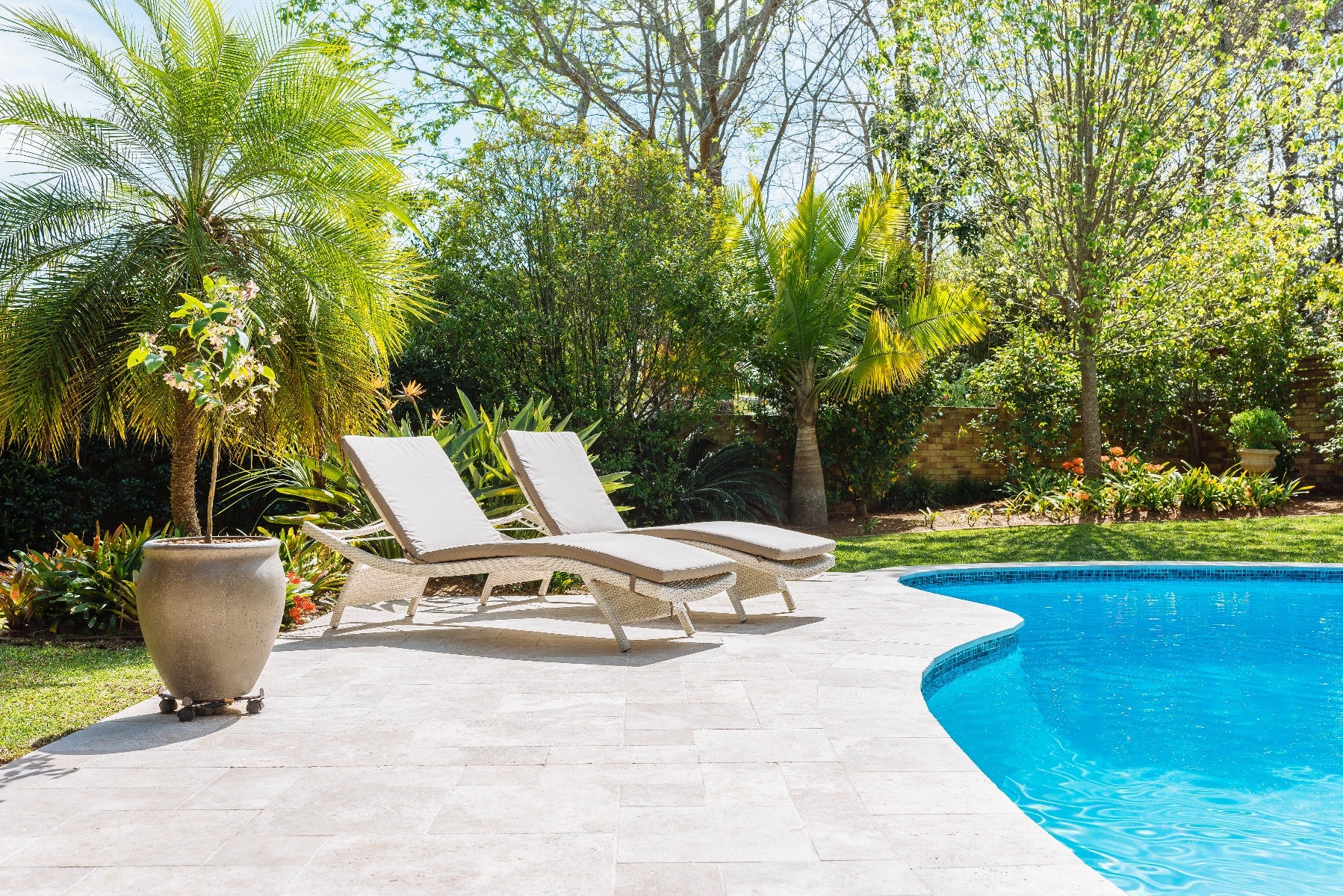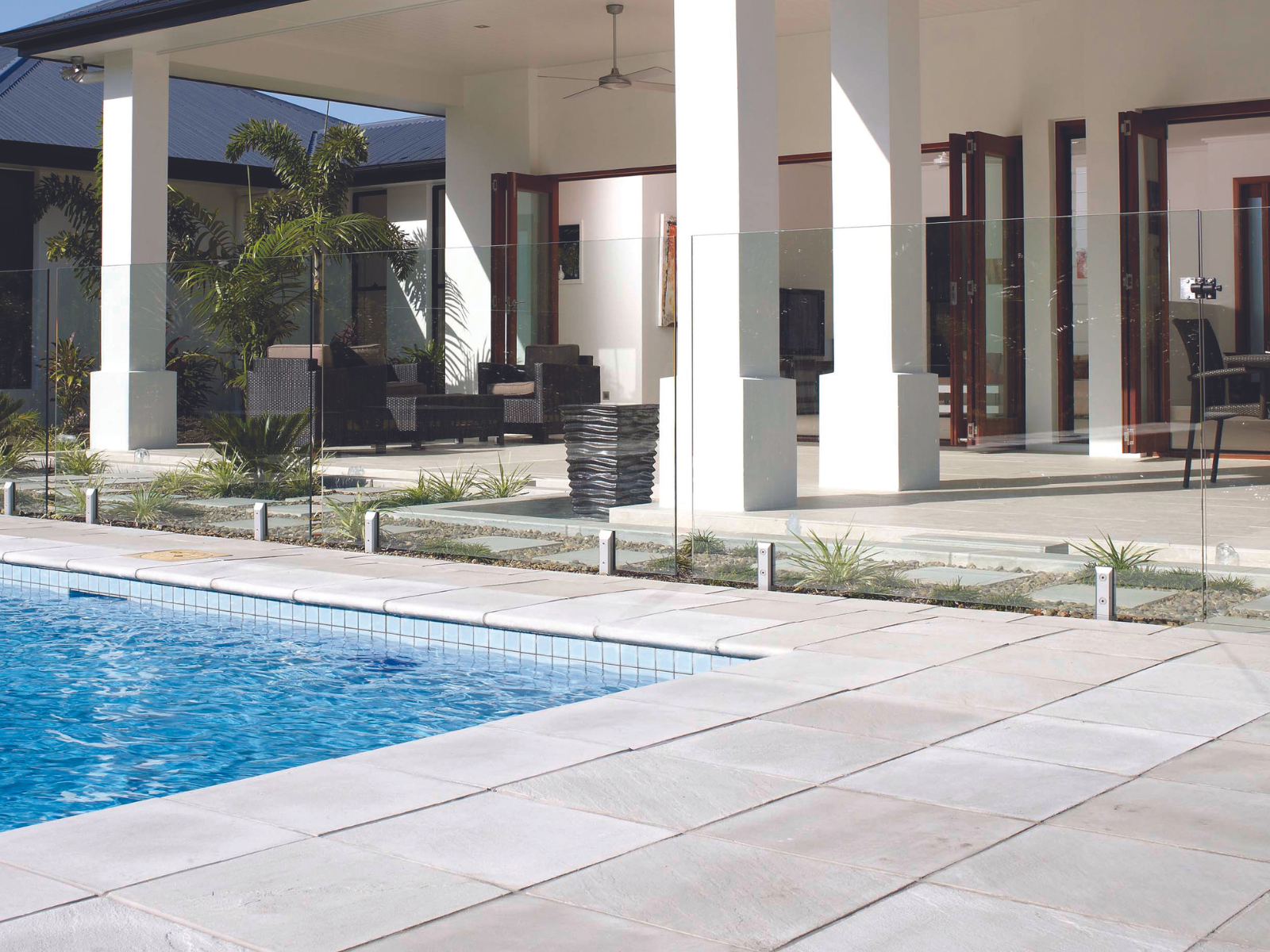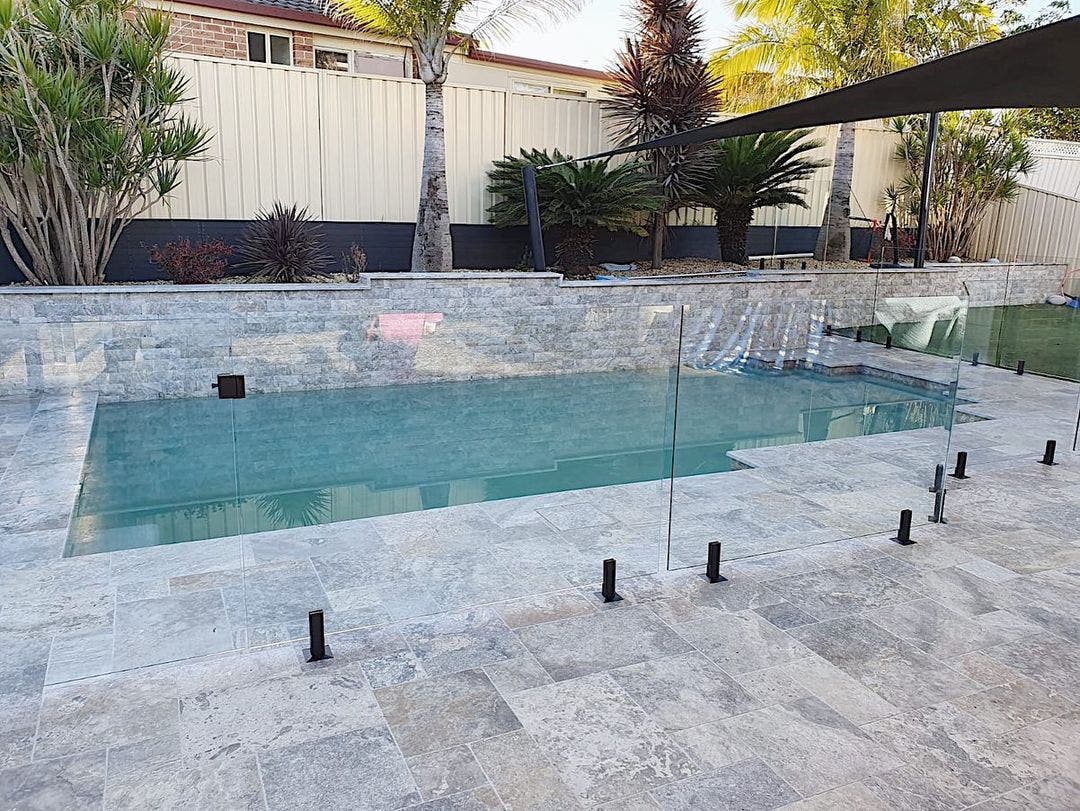Articles
Travertine Vs Pavers: Expert Guide On The Differences
16.12.24
Travertine and pavers are two of the most sought-after materials for outdoor surfaces like patios, pool decks, and driveways, and for good reason!
Selecting the right material can completely change the appearance and feel of your outdoor space.
In this blog, we’ll compare the standout characteristics, advantages, and disadvantages of travertine vs pavers, helping you make an informed choice for your ideal outdoor area! Let’s dive in!
Comparing Travertine and Pavers: Which Is Right for You?

What is Travertine?
Travertine is a type of limestone formed by mineral deposits in hot springs and caves.
This natural stone, known for its unique, textured surface and warm, earthy tones, is often used in beautiful travertine tiles for flooring and wall coverings.
Characteristics include:
- Distinctive patterns and colours
- Strong and durable
- Porous nature
- Heat resistant, making it ideal for hot climates
- Natural slip resistance, especially when wet
Travertine tiles are visually appealing and incredibly versatile, making them a popular choice for various outdoor applications.
For example:
- Pool decks: Travertine is excellent for pool decks because its porous nature creates a cool and non-slip surface that is comfortable underfoot in hot weather.
- Garden paths: Travertine adds a touch of elegance to garden paths, enhancing the overall aesthetic with its natural beauty.
- Outdoor stairs: Travertine offers durability with a luxe appearance that complements landscaped settings.
Benefits of travertine:
- Aesthetic appeal: Its unique patterns and colours add a touch of luxury to any space.
- Timeless: Its classic look never goes out of style.
- Eco-friendly: As a natural material, it's a sustainable choice.
Travertine offers a variety of colours, including classic beige, warm brown, cool grey, and mixed tones.
These options provide versatility, enhancing various design styles with warmth, sophistication, and uniqueness.
Getting to know the features, advantages, and beauty of travertine can help you decide if it's the perfect fit for your next home improvement project.

Types of Pavers
Pavers are versatile materials used for creating beautiful and functional outdoor spaces. They come in various materials, each with its own unique characteristics and benefits.
Popular types of pavers:
Pavers are versatile and can enhance the beauty and functionality of various outdoor spaces.
Check out these common uses for pavers:
- Driveways: Pavers can create a stunning and durable driveway that adds curb appeal to your home.
- Patios: Pavers are an excellent option for turning outdoor areas into inviting living spaces, such as beautiful patios.
- Entertainment areas: Pavers offer a firm foundation for outdoor kitchens, barbecues, and seating areas.
Pavers also offers a wide range of design possibilities, allowing you to create unique and personalised outdoor spaces.
Some popular design options include:
- Pattern layouts: Pavers can be arranged in various patterns, such as herringbone, basketweave, and running bond.
- Custom shapes: Pavers can be cut into custom shapes to create unique designs and borders.
- Inlays: Adding decorative inlays, such as medallions or mosaics, can elevate the look of your paver project.
By exploring the various types and design options available, you can create a breathtaking and functional environment that perfectly complements your home’s style and enhances your lifestyle.
Products you might be interested in
Travertine vs. Pavers: Key Differences
While both travertine and pavers are popular choices for outdoor surfaces, they have distinct characteristics that can influence your decision.
Let's explore the differences in the debate of travertine vs pavers.
Material Composition and Texture
- Travertine: A natural stone formed from mineral deposits, travertine has a unique, textured surface with distinctive holes and grooves.
- Pavers: Can be made from various materials, including concrete, natural stone, or clay. They come in a wide range of textures, from smooth to textured, and can be customised to match your desired look.
Durability and Weather Resistance
- Travertine: While durable, travertine is more porous than some other stones, making it susceptible to staining and water damage.
- Pavers: Generally more durable and weather-resistant than travertine, particularly concrete pavers. They can withstand heavy foot traffic, harsh weather conditions, and temperature fluctuations.
Installation Processes and Considerations
- Travertine: Installation requires skilled labour to cut and shape the stone, as well as careful planning to ensure proper drainage.
- Pavers: Installation is generally easier and can be done by DIY enthusiasts or professional installers. The process involves preparing the base, laying the pavers, and filling the joints with sand or polymeric sand.
Cost Comparison and Long-Term Value
- Travertine: Typically more expensive than pavers, especially high-quality varieties. However, its natural beauty and unique texture can add significant value to your property.
- Pavers: More affordable, especially concrete pavers. While they may not have the same luxurious appeal as travertine, they can still create a beautiful and durable outdoor space.
By carefully weighing all these factors, you can make an informed decision that will enhance the beauty and functionality of your outdoor space.

Maintenance and Care
While both travertine and pavers can enhance the beauty of your outdoor space, they require regular maintenance to maintain their appearance and longevity.
Travertine Maintenance
- Regular cleaning: Gently sweep or vacuum the surface to remove dirt and debris. For deeper cleaning, use a mild detergent and soft brush.
- Sealing: Applying sealant every 1 to 2 years is necessary to protect it from the elements.
- Avoid acidic cleaners: Acidic cleaners can damage the surface of travertine. Use a pH-neutral cleaner instead.
Paver Maintenance
- Regular cleaning: Sweep or use a pressure washer to remove dirt, grime, and debris.
- Weed control: Regularly remove weeds from the joints between pavers to prevent damage to the surface.
- Resealing: Depending on the type of paver, you may need to reapply a paver sealant every few years to protect the surface from stains and weathering.
Longevity and Repair Considerations
- Travertine: With proper care, travertine can last for many years. However, it's important to address any chips or cracks promptly to prevent further damage.
- Pavers: Pavers are generally more durable and can withstand heavy foot traffic and harsh weather conditions. However, they may require occasional repairs, such as replacing damaged pavers or re-sanding the joints.
Follow these maintenance tips to keep your travertine, or paver surfaces looking stunning and working great for years to come!
FAQs About Travertine Vs Pavers
What Is More Expensive, Travertine or Pavers?
Travertine is usually more expensive than pavers due to its luxurious look and unique colours, appealing to those wanting a high-end aesthetic. Pavers are a more budget-friendly option with a variety of styles.
Which Is More Durable, Travertine or Concrete Pavers?
Concrete pavers are generally more durable than travertine. They can withstand heavy traffic and harsh weather better, while travertine requires proper maintenance to avoid damage.
How Does Weather Affect Travertine and Pavers?
Weather affects travertine by making it susceptible to erosion or staining from acidic rain if not sealed. Pavers are more resilient, but temperature changes can cause them to shift or settle, needing occasional maintenance.
What Are the Best Uses for Travertine and Pavers?
Travertine is ideal for sophisticated spaces like pool decks and indoor flooring, showcasing its natural beauty.
Pavers are versatile for driveways, walkways, and outdoor areas, offering durability and various design options.
Choose the Perfect Surface With Amber
Travertine vs. pavers each offer unique benefits for outdoor spaces. Travertine, a stunning natural stone, brings a timeless and luxurious vibe but does need a bit of TLC to maintain its beauty.
On the flip side, pavers are incredibly versatile and durable, often more budget-friendly, and come in various styles and colours to match your vision.
Excited to discover your possibilities?
Explore Amber’s stunning selection of Travertine tiles and pavers!
Looking for tailored advice?
Schedule a design consultation with our experts today! Together, we’ll turn your dream outdoor oasis into a reality!







